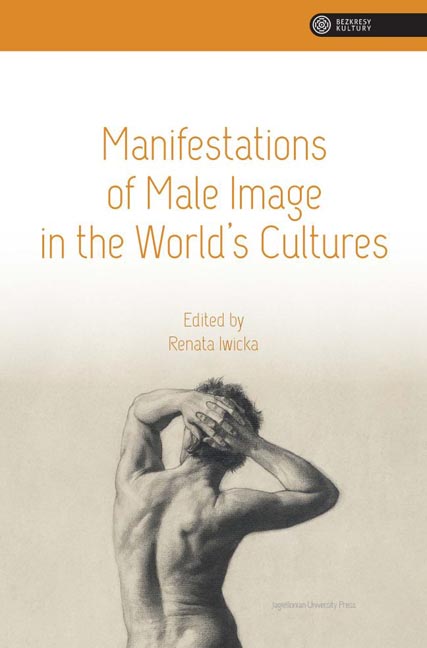Book contents
- Frontmatter
- Contents
- Preface
- “A Jewel Beyond Compare”: Prince Hikaru Genji As A Perfect Male Of The Heian Period In The Light Of Popular Culture Theories
- Cicero and Male Virtue
- Kill The Savage, Save The Man – James Welch’s Chronicle Of Native American History
- On (Self-)Representations Of Masculinity In Siyāmak Herawi’s Short Stories
- Power, Masculinity, And War: Superman, A Case Study
- Redefining New Masculinity In Korean Television Drama Series
- Stripping The Vampire. Erotic Imaginations and Sexual Fantasies In Paranormal Romances (A Study Of Selected Examples)
- The Horned God: Divine Male Principle In British Traditional Wicca
- Biographical Notes of the Authors
- Miscellaneous Endmatter
On (Self-)Representations Of Masculinity In Siyāmak Herawi’s Short Stories
Published online by Cambridge University Press: 14 October 2023
- Frontmatter
- Contents
- Preface
- “A Jewel Beyond Compare”: Prince Hikaru Genji As A Perfect Male Of The Heian Period In The Light Of Popular Culture Theories
- Cicero and Male Virtue
- Kill The Savage, Save The Man – James Welch’s Chronicle Of Native American History
- On (Self-)Representations Of Masculinity In Siyāmak Herawi’s Short Stories
- Power, Masculinity, And War: Superman, A Case Study
- Redefining New Masculinity In Korean Television Drama Series
- Stripping The Vampire. Erotic Imaginations and Sexual Fantasies In Paranormal Romances (A Study Of Selected Examples)
- The Horned God: Divine Male Principle In British Traditional Wicca
- Biographical Notes of the Authors
- Miscellaneous Endmatter
Summary
Le mâle n’est mâle qu’en certains
instants, la femelle est femelle toute sa
vie, ou du moins toute sa jeunesse.
Abstract: The article deals with masculinity in Afghan culture. Research data consist of five stories selected from the collection Buy-e behi (The scent of quince) by modern Afghan writer living in exile – Ahmad-Ziyā Siyāmak Herawi. The theoretical basis of the research are texts by Terry Eagleton and Pierre Bourdieu, supplemented by, inter alia, works of Élisabeth Badinter. The article consists of five parts. Part 0. presents the writer. Part 1. – methodology. Part 2. summarises five stories. Part 3. discusses (self-)representations of masculinity in Afghan culture. Part 4 is a summary.
Keywords: masculinity, Afghanistan, literature
In our contribution to the project ‒ Manifestations of Male Energy in the World’s Cultures ‒ we shall discuss literary (self-)representations of masculinity that can be found in a collection of short stories Buy-e behi (The scent of quince) by the contemporary Afghan writer Ahmad-Ziyā Siyāmak Herawi.
0.1. Our reason to start a discussion on (self-)representations of masculinity in modern Afghan literature is the increasing interest this topic has garnered during the past decade. We would like our text to be a supplement to that discussion, because, as Shahin Gerami writes, studying so-called concepts of Muslim masculinities facilitates women-/gender-/ men-oriented research in Islamic and general studies.
0.2. Currently living in the United Kingdom, Siyāmak Herawi is a modern Afghan Dari-speaking novelist, writer, journalist and former diplomat. Born in 1968 in a village near Herat, he moved with his parents to Kabul in 1980 where he enrolled at the prestigious high school Lise-ye Habibiya (Lycée Habibia). In 1984 he entered the Department of Persian Language and Literature at the capital university and soon afterwards received a scholarship to study Russian literature in Stavropol (today’s Russia). He earned his MA degree defending his thesis on culture and history in Leo Tolstoy’s works. Upon his return to Kabul in 1991, he worked as a journalist until 1996, while between 2002 and 2004 he served as the editor-in-chief of the all-Afghan newspaper Ruznāme-ye Anis (Anis Newspaper).
- Type
- Chapter
- Information
- Manifestations of Male Image in the World's Cultures , pp. 67 - 86Publisher: Jagiellonian University PressPrint publication year: 2021



